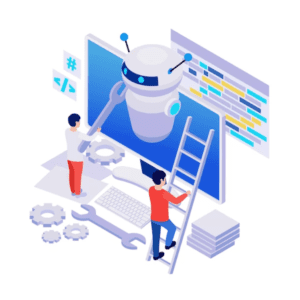Build Automation Software and Cloud Platform

In recent years there has been a rise in startup culture. We are seeing startups with innovative products everywhere. A few years ago launching a startup was quite difficult and expensive. But cloud platforms have emerged as superheroes. These superheroes have immense powers that can make or break a startup’s success.
Cloud computing provides a lot of benefits that can elevate your business to new heights. It provides scalability, flexibility, cost-effectiveness, and security. As a startup every penny counts and demand can be sometimes unpredictable. This is where the cloud platforms swoop in to save the day. Cloud platforms save startups from the upfront and maintenance costs of infrastructure.
The advantages of cloud computing for startups can not be denied. But there are certain guidelines every startup should follow when launching a product on the cloud. In this article, we will explore the top 10 guidelines for startups when launching a product on the cloud.
We will also highlight the role of Nife Labs, a powerful cloud computing platform, in facilitating a successful product launch. By following these guidelines and leveraging the capabilities of Nife Labs, organizations can set themselves up for a seamless and impactful product launch on the cloud.
Pre-launch Preparation
The first step when launching a product on the cloud is to set a clear goal in mind. You need to identify and highlight the features of your products. Identify problems your product can solve. Once you have completely analyzed your product it is time to find out your target audience and their pain points. Based on your audience’s pain points you can create effective strategies for your product.
Conduct Market Research
Another important part of pre-launch preparation is to analyze your competitors. Analyzing them will help you find market gaps that you can fill with your product. Moreover, you can learn from their failures and mistakes. Analyze all the strengths and weaknesses of your competition’s product. Researching different build automation software tools available in the market
Researching various cloud management platforms and their offerings. Evaluating the scalability, reliability, and security features of each platform. Evaluate different aspects like cost, and performance and seek feedback from other startups or industry professionals who have used the platforms. Select the most suitable cloud management platform that aligns with the startup’s needs and requirements.
Establish A Budget
As a startup, you have limited resources which you need to distribute wisely. Consider the costs associated with cloud infrastructure, development tools, marketing, and personnel. Create a well-defined budget to allocate resources.
Selecting the Right Cloud Platform
To navigate through the waters of cloud technology, startups need a trustworthy companion. This is where Nife Labs stands out as a valuable choice. Nife Labs offers a comprehensive suite of cloud computing services and tools that can greatly facilitate the product launch process. Here’s why Nife Labs is a useful platform:
Scalability: Nife Labs provides scalable infrastructure and resources, allowing businesses to easily accommodate varying levels of demand. This ensures that the product can handle increased user traffic and scale seamlessly as the user base grows.
Security: Security is a top priority, and Nife Labs offers robust security measures to protect sensitive data and infrastructure. With advanced security features such as encryption, access controls, and threat detection, Nife Labs helps mitigate risks and ensures the product is secure.
Cost-efficiency: Nife Labs offers cost-effective cloud solutions, enabling businesses to optimize their budget and resource allocation. With flexible pricing models and pay-as-you-go options, organizations can scale their usage and control costs effectively.
Integration and compatibility: Nife Labs integrates well with other cloud services, enabling seamless integration with existing systems and tools. This ensures a smooth transition and minimizes disruptions during the product launch process.
Nife Labs acts as a reliable foundation, empowering organizations to focus on their product development and user experience while ensuring a successful launch on the cloud. Supercharge your product launch on the cloud with Nife. Experience rapid deployment, effortless scaling, and simplified management.
CTA: Explore the transformative capabilities of Nife Labs now!
Build Automation Software
Startups should build automation software to automate different tasks on the cloud. Automation is like having a team of invisible employees who work efficiently 24/7. Most startups are short-staffed and low-budget, automating routine tasks enables them to focus their time and energy on more important things.
Startups need to identify areas where they can get the most benefit out of automation. For example, automation can be used in CI/CD to automate the build, test, deployment cycles, and DevOps automation. This will reduce the time from development to delivery. Automating infrastructure provisioning allows for faster response time to market.
DevOps automation also plays an important role in launching products on the cloud. It increases collaboration between development and operation teams breaking traditional silos and fostering a relationship of collaboration. DevOps automation enables faster and more frequent releases and empowers businesses to monitor and optimize their product’s performance.
Ensuring Log Monitoring and Analysis
Log monitoring is an important aspect to consider when launching a product on the cloud. It involves collecting information from various components of the product which include application, server, database, and storage. Log information provides valuable insight into the performance, behavior, and security of the product. Log monitoring helps identify and mitigate real-time issues in the product.
Nife Labs offers powerful log monitoring and analysis capabilities to ensure optimal product performance. With Nife Labs, businesses can set up centralized logging and real-time monitoring, gaining insights into system behavior. Startups should utilize the log monitoring capabilities of platforms like Nife to streamline their workflow.
Implementing DevOps Automation
DevOps automation is a game-changer for startups looking to launch their product on the cloud. Combining development and operations teams streamlines the software delivery process and boosts productivity. Through continuous integration and deployment, DevOps automation enables startups to rapidly iterate and release their product, gaining a competitive advantage. It provides scalability and flexibility, allowing startups to dynamically adjust their infrastructure based on user demands.
With automated infrastructure provisioning and configuration management, startups can ensure stability and reliability, minimizing the risk of errors. DevOps automation empowers startups to achieve faster time-to-market, improved efficiency, and enhanced overall quality in their cloud product launches.
Security and Compliance Considerations
When launching a product on the cloud, it is crucial to prioritize security from the outset. Incorporating security measures into the product architecture helps safeguard data, protect against threats, and maintain the trust of users. Startups should consider the following security measures:
Secure authentication and authorization
Startups should implement authentication and authorization mechanisms. They can use multi-factor authentication, strong passwords, and access control to safeguard their product.
Utilize Log Monitoring Software
Utilize log monitoring software for streamlined system management. Visualize and search logs for actionable insights. Ensure compliance with auditing capabilities and generate detailed reports. Enhance security and mitigate risks during product launch on the cloud.
Encryption
Encryption provides an extra layer of security. It makes your data unreadable to unauthorized people without the encryption key. Startups should leverage encryption to secure their data at rest and in transit. Startups should also encrypt their communication channels.
Secure coding practices
Follow secure coding practices to mitigate common vulnerabilities like cross-site scripting (XSS), SQL injection, and cross-site request forgery (CSRF). Conduct security tests and code reviews regularly to identify and fix any security flaws.
Explore Secure Cloud Management Platforms
Explore cloud management platforms with built-in security features for efficient system management. Ensure data security at rest and in transit. Implement measures for compliance with industry regulations. Leverage advanced security capabilities such as encryption and access controls.
Secure APIs
If your product exposes APIs, ensure they are designed with security in mind. Implement authentication and authorization mechanisms, input validation, and rate limiting, and consider using API gateways or security frameworks for additional protection.
Performance Testing and Optimization
Performance testing and optimization is another important step for startups to ensure products launched on the cloud meet customer expectations. Performance testing involves the measurement of various metrics under different conditions to ensure the responsiveness, stability, and scalability of the product. Here are key steps startups can follow:
Identify Performance Objective: Identify performance goals you want your product to achieve such as response time and resource utilization. This will help you understand what you want from your product.
Utilize Log Monitoring Software: Incorporate log monitoring software for real-time performance insights. Monitor system and application logs to identify performance bottlenecks, errors, or anomalies. Analyze log data to optimize resource utilization and enhance system performance.
Create realistic test scenarios: Create real-world test scenarios to get accurate performance results. Test your product under different situations, and consider factors like concurrency, data volume, and transaction rates to create realistic workload profiles.
Explore Cloud Management Platforms: Explore cloud management platforms with performance optimization features. Leverage tools for auto-scaling, load balancing, and resource optimization. Ensure high availability and scalability for the product launch.
Once you have identified underlying performance problems with your product. Take necessary actions to solve those problems. Make sure your product is responsive and scalable.
User Experience and Feedback
User experience goes a long way in the success of a product launch on the cloud. Startups should prioritize user experience by conducting user research, simplifying product design, and ensuring consistency. Startups should introduce updates more often to cope with changing customer needs.
Nife Labs plays a significant role in prioritizing user experience and gathering valuable feedback for product improvement. Through Nife Labs, businesses can implement user-centric updates and enhancements based on real-time feedback.
By prioritizing user experience and actively seeking and incorporating user feedback, organizations can create products that truly meet the needs of their target audience and drive user engagement and loyalty.
Post-launch Evaluation and Iteration

To make a product launch successful on the cloud, startups need to analyze real-time performance and user adoption of their product. This will help them evaluate the effectiveness of their launch strategy. Startups can identify areas where they need improvements by comparing the real-time metrics of a product with anticipated metrics.
Startups need to develop a plan for ongoing maintenance, updates, and support. This includes bug fixes, security patches, feature enhancements, and addressing user feedback to ensure the product remains relevant and competitive in the long term.
Utilize log monitoring software for post-launch analysis. Analyze logs to gather valuable insights into user feedback and system performance. Identify areas for improvement based on data-driven decisions. Continuously enhance the product to ensure customer satisfaction and success in the cloud.
Startups can leverage build automation software for efficient product updates and enhancements. Startups can automate the deployment of code changes and new features, reducing manual effort and minimizing errors. Startups can also streamline the iteration and optimization process based on user feedback and metrics.
By continuously evaluating and iterating the product post-launch, organizations can adapt to user needs, address any issues or shortcomings, and ensure the product’s continued success in the market.
Conclusion:
In conclusion, launching a product on the cloud requires careful planning and execution. By following the guidelines outlined in this article and leveraging the capabilities of Nife Labs, businesses can maximize their chances of success.
From implementing automation to ensuring security, and prioritizing user experience, Nife Labs offers valuable features that streamline the product launch process. By embracing these guidelines and utilizing the Nife cloud computing platform, organizations can achieve a successful and efficient product launch on the cloud.






